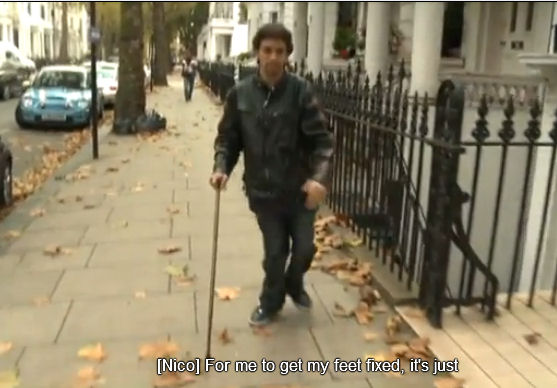[easyazon-image align=”left” asin=”B001QIP5C8″ locale=”us” height=”160″ src=”http://ecx.images-amazon.com/images/I/51TxlHdoXbL._SL160_.jpg” width=”110″][easyazon-link asin=”B001QIP5C8″ locale=”us”]Normal People Scare Me[/easyazon-link] is a unique film because it features interviews with people who are living with autism speaking for themselves, as well as a handful of parents of children with autism, some of whom get diagnosed with Autism Spectrum Disorders themselves while their children are going through the process.
Besides the parents and siblings sharing candid observations about people with autism, a diverse group of youths with various degrees of ASD are given the opportunity to speak out on certain distinctive aspects of their symptomology and how it affects their daily lives. (One who does not speak nevertheless sits for interviews, and responds to verbal cues from his father by squeezing a finger as a response, with statements broken down into multiple-choice questions by his father/interpreter for this purpose.)
Among the examples of sensory sensitivities not felt as intensely by “normal” people, but remarked upon by people with autism, were food textures, loud, sudden, high-pitched sounds, itchy clothing tags, certain smells and tastes. This gives a window into a daily existence where some seemingly mundane experiences which might not bother “normal” people loom fearfully for people with ASD. Other collations of sound bites show a range of experiences with socialization, scholastic aptitude, and life with “normals”, i.e., “neurotypicals”, better known on websites for the ASD community as “NTs”, who are at best mysterious and ignorant, at worst, school bullies and judgmental parents on the outside looking in.
No wonder that a few people with ASD, given the opportunity to express their thoughts in sound bytes on the video format, allow that “normal” people scare them. (A few hint that some of the so-called “normal” people might well be other, more nefarious things, merely masquerading as “normal”.)
Some of those who are young adults with ASD, including the filmmaker, additionally discuss their future plans, such as entering college, and their prospects of success with academic work and peer socialization.
Someone who commented on the YouTube trailer of the movie shared the desire for quality captioning of the movie, albeit for different reasons:
“I hope? you will consider captioning the film so that it will be accessible to people with hearing impairment or auditory processing difficulties. The automatic captioning is not very good, so adding the correct captions is crucial.”

